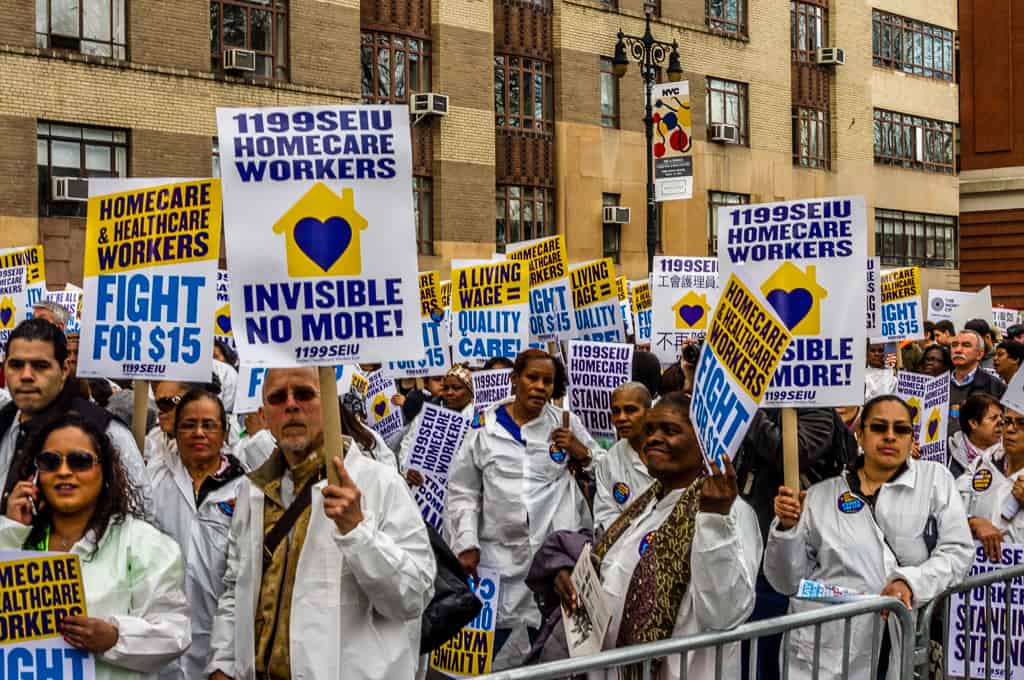Mackenzie Bouverat is a student at Harvard Law School.
In Local 23, American Federation of Musicians v. NLRB, a D.C. Circuit panel overturned the National Labor Relations Board’s Trump-era legal rule for deciding when property owners can lawfully exclude employees of contractors. The rule, which was established in 2019, overturned two Obama-era precedents on off-duty contractor worker access: New York New York Hotel & Casino , and Simon DeBartolo Group , both of which establish broader circumstances for for permitting contract workers to protest on a third-party’s property. The Trump-era rule permits property owners to bar off-duty contractors from protesting on company property unless they work regularly and exclusively on the property and the owner can not show they have a reasonable alternative for communicating their message. The rule was established in the Board’s 2019 Bexar County (Tobin Center) decision, in which the Board permitted a San Antonio auditorium to block symphony musicians from protesting a ballet company’s use of recorded music inside the arts center. The case has been remanded to the Board for reconsideration of the contractor access rule.
The Southern District of New York this Monday held that the United States Security Officers Union, which represents security officers at federal courthouses, lacks standing to sue their contractor-employer and the U.S. Marshals Service for insufficient Covid-19 workplace safety measures. The union alleged that the inadequate sanitation and personal protective equipment policies of the USMS and Centerra Group LLC exposed union members to the virus; individual officers contracted covid-19, and some died. The court held that the union failed to allege that the organization itself suffered or risked injury as a result of the USMS’s and Centerra’s policies and therefore lacked standing to bring the suit. The union “must suffer some distinctive injury to itself” to assert “organizational standing.” The case is Massone v. Washington.
The California Court of Appeal has revived a wrongful termination and retaliation claim by a former Nestlé employee. The case, Ortega v. Nestle Water North America Inc., involves a Nestlé water delivery driver, Ricardo Ortega, who frequently complained about unsafe working conditions and wage and hour violations. Ortega also participated in an unsuccessful effort to unionize Nestlé workers. He was fired in 2016, and subsequently brought this claim. The Los Angeles Superior Court dismissed on the grounds that the causes of action were preempted by the NLRA or the Worker’s Compensation Act. The Court of Appeal concluded that Ortega’s claims were based on allegations that Nestle fired or retaliated against Ortega due to his complaints about unsafe working conditions — not due to his unionization efforts. Since the complaints do not reflect concerted activity, they are not preempted by the NLRA.
On Monday, a federal appeals court addressed for the first time the question of whether a company can, based solely on whether a claim is timely filed in bankruptcy court, eliminate claims that arise after a plan is confirmed but before it goes into effect. In Ellis v. Westinghouse Elec. Co., LLC , the Third Circuit held that companies in Chapter 11 bankruptcy are not liable for claims arising in between a bankruptcy plan confirmation and the plan’s effective date. Therefore, former Westinghouse executive Timothy Ellis, who alleged that he was terminated in May 2018 due to his age, could not collect from the company because he did not meet the Aug. 31, 2018, deadline to file his claim in the bankruptcy case.






Daily News & Commentary
Start your day with our roundup of the latest labor developments. See all
February 15
The Office of Personnel Management directs federal agencies to terminate their collective bargaining agreements, and Indian farmworkers engage in a one-day strike to protest a trade deal with the United States.
February 13
Sex workers in Nevada fight to become the nation’s first to unionize; industry groups push NLRB to establish a more business-friendly test for independent contractor status; and UFCW launches an anti-AI price setting in grocery store campaign.
February 12
Teamsters sue UPS over buyout program; flight attendants and pilots call for leadership change at American Airlines; and Argentina considers major labor reforms despite forceful opposition.
February 11
Hollywood begins negotiations for a new labor agreement with writers and actors; the EEOC launches an investigation into Nike’s DEI programs and potential discrimination against white workers; and Mayor Mamdani circulates a memo regarding the city’s Economic Development Corporation.
February 10
San Francisco teachers walk out; NLRB reverses course on SpaceX; NYC nurses secure tentative agreements.
February 9
FTC argues DEI is anticompetitive collusion, Supreme Court may decide scope of exception to forced arbitration, NJ pauses ABC test rule.